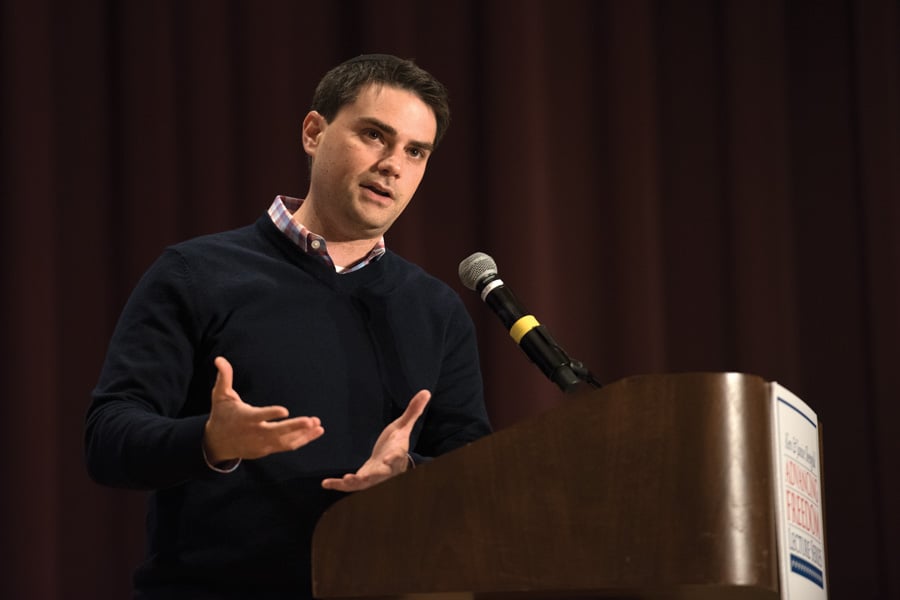Controversial conservative speaker Ben Shapiro discusses politics, NU issues
Kate Salvidio/The Daily Northwestern
Political commentator Ben Shapiro speaks during an event hosted by College Republicans in McCormick Auditorium on Wednesday. Shapiro discussed a variety of social, political and campus-specific topics.
May 25, 2017
Conservative commentator Ben Shapiro spoke about numerous issues including economic mobility and contemporary campus culture as College Republicans’ spring speaker Wednesday.
The event, held in McCormick Auditorium in Norris University Center, was also sponsored by Young America’s Foundation. Shapiro, editor in chief of conservative website The Daily Wire, discussed a variety of political and social issues and fielded questions from many students who were critical of his views. More than 360 people attended the event.
College Republicans vice president Grant Papastefan said he was happy with the large turnout. The group initially anticipated far fewer people purchasing tickets and was pleased to see tickets sell out, he said.
“I heard from several people in the minutes after the event that they didn’t hate him as much as they thought they would,” said Papastefan, a Bienen sophomore.
With his signature abrasive style that incited many rounds of laughter from the audience, Shapiro spoke about topics ranging from economic mobility to sexual assault on college campuses before moving on to answer audience questions.
Shapiro also offered commentary on NU-specific issues, criticizing University President Morton Schapiro’s support for safe spaces and the protesters who interrupted the visit of an Immigration and Customs Enforcement public relations representative to a class last week before moving on to what he called the “offensive part” of his speech.
Shapiro presented data and opinions that he said refuted the idea that a number of minority groups experienced systemic victimization. He also criticized the left for correlating one’s perceived level of victimization to the importance of their opinion.
In response to the investigation into the Sigma Alpha Epsilon fraternity sexual assault allegations, Shapiro said there was a “lack of evidence.” He also said the Title IX complaint filed against Communication Prof. Laura Kipnis was “ridiculous.”
After encouraging audience members with differing viewpoints to come to the front of the Q&A line, Shapiro then engaged in a number of debates with students.
“One of the reasons I do this in a caustic manner is because if you’re entertaining people, then you’re also getting them to listen to you,” Shapiro said. “By me being aggressive, that basically says to the left, ‘Okay, back off, we’re not going to make character attacks on each other,’ and now we can have a discussion.”
Weinberg sophomore Spenser Huang, who attended the event, said he took issue with Shapiro citing what Huang considered out-of-date statistics and using his position of power to brush aside a questioner, but largely respected the way Shapiro conducted himself.
“My impression afterwards is that he comes from a lot of stuff has strong logical basis, (but we) just have different fundamental values,” Huang said. “What I really did appreciate was how civil he conducted the conversation and how open to new ideas he was.”
Khaqan Ahmad, a SESP freshman, said while he doesn’t agree with “most basically anything” that Shapiro said, he thought it was “a good experience in having those dialogues with people” he doesn’t agree with.
However, Ahmad said the implications of many of Shapiro’s statements were “bigoted.”
“I don’t think he was respectful of many groups of people including minorities, women (and) people in the transgender community,” he said. “At times it felt very uncomfortable.”
Ahmad said he disagreed in particular with Shapiro’s statement about people living in poverty. Shapiro said during the speech those who didn’t want to live in poverty had to do “three simple things”: marry before having kids, finish high school and get a job.
“As somebody who is a QuestBridge scholar, who came from a low-income background,” Ahmad said. “I definitely disagreed with his point that most people are in poverty because of their own doing. … I really think that’s incorrect.”
Papastefan said Shapiro’s talk was the most difficult for College Republicans to organize logistically since Newt Gingrich’s visit in fall 2015, requiring several meetings with Norris officials and University Police.
“We thought that he’d do a good job of representing our club, not in that we agree with everything he says,” Papastefan said, “but that just that he presents his views in a way that forces people to think about them.”
A previous version of this story misstated Spenser Huang’s year. Huang is a sophomore. The Daily regrets the error.
Email: [email protected]
Twitter: @benpope111
Email: [email protected]
Twitter: @noracshelly












